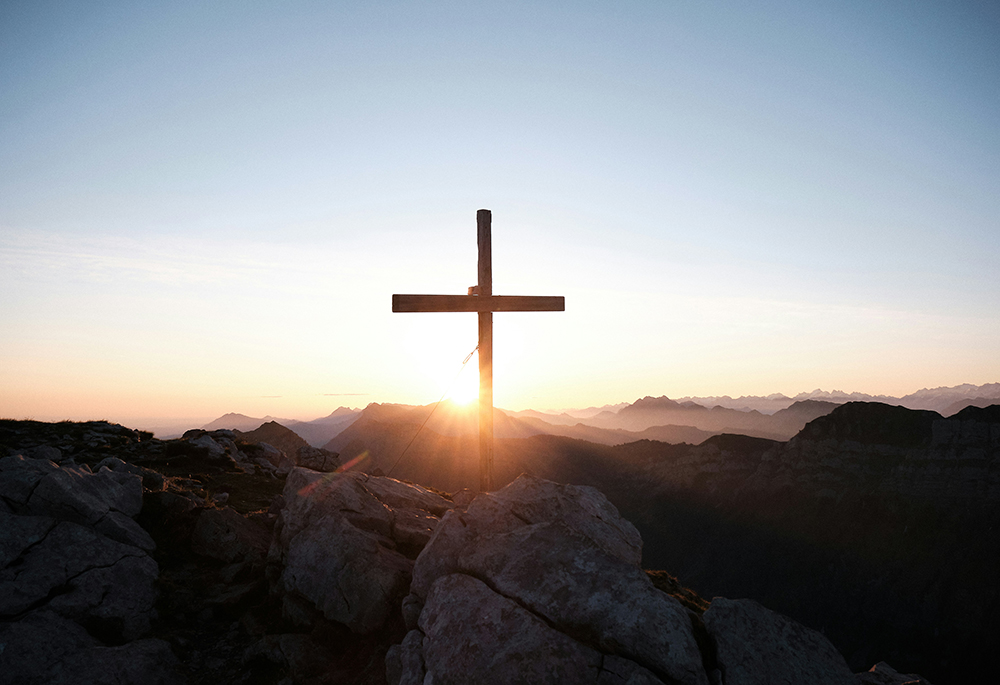
(Unsplash/Yannick Pulver)
"The people who walked in darkness have seen a great light."
—Isaiah 9:1
Amid a world plagued by violence, corruption, inequality and suffering, the panelists responded to the question: What darkness do you long for God's light to fill in the coming year?
Each response shines with hope and faith in the transformative power of God's light and love.
______
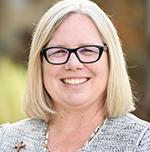
Linda Buck is a Sister of St. Joseph of Orange, California. Her ministry is informed by transformative leadership, psychology, theology and transformational social change. She uses her academic and experiential background to promote culture change within current and emergent systems, including religious life. She is the executive director for the Leadership Collaborative. Prior to this, she was director of initial formation/novice director for her congregation, a psychotherapist and spiritual director.
My favorite time of day is early morning as the sun begins to peek above the horizon. As it emerges, the glow of pinks and orange fills the sky and I find myself holding my breath slightly, in awe of what is before me. There is a mingling of light and dark at this time of the morning. For me, this is an important aspect of life, as we hold both in tension.
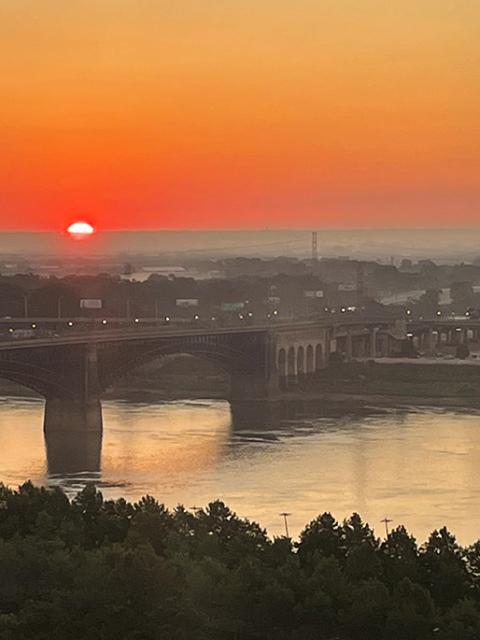
Sunrise over the Mississippi River in St. Louis, Missouri (Linda Buck)
I actually try not to use light and dark because it indicates a judgment that something light or white is good and that something dark or black is bad. Rather, I try to speak about wholeness and unfreedoms. What are unfreedoms in my life which hold me back from living the Gospel message authentically? Where are the places in my life that allow me to be expansive, whole, and creatively live God's call? The unfreedoms may be held within my own person, like beliefs and attitudes or wounds of the past. They may also be systemic, such as structural oppression or lack of resources. I am very aware that I have many more freedoms than my sisters and brothers who exist bodily or psychologically on the margins.
When I reflect on the question, "What darkness do you long for God's light to fill in the coming year?" I am thinking I should say something about the environment or immigration, or the wars and conflicts happening around the world. For me, it needs to start closer to home — with myself — as well as to address the underlying source that keeps the world in crisis.
Thus, my greatest hope is that we all reflect on how the systems we are a part of — our institutions (such as health care, education, social services), congregations, governments, religions — continue to create and sustain oppression of those relegated to the periphery of society. God's love is present in our world in a tangible way through our lives. My longing is that I can be brave and vulnerable enough to encounter myself as I do the ongoing work to reconcile my collusion in supporting and benefiting from structural oppression — and at times, even creating it.
The year 2024 will continue to hold the tension of promise and pain. Our God is a great comforter who needs our collaboration and faithfulness to bring a healing balm to our beautiful yet wounded world.
'The year 2024 will continue to hold the tension of promise and pain. Our God is a great comforter who needs our collaboration and faithfulness to bring a healing balm to our beautiful yet wounded world.'
—Sr. Linda Buck

Julian Cleary is a member of the Benedictine community of St. Placid Priory in Lacey, Washington. She is a licensed attorney, having worked for many years with adults and children with disabilities before entering the monastery. She has occasionally advocated for detained refugees and hopes to be more involved with this ministry in the future. Her current ministries include work as a spiritual director, participating in the monastery's health care team (she is a former nurse practitioner), liturgy committee, grant-writing and other projects.
I long for God's light to penetrate the darkness of suffering — the darkness that is often present within physical, spiritual, emotional, and psychological pain in all human beings and sentient creatures. This is a nearly impossible longing, but with God, nothing is impossible. Our God is compassionate and takes no delight in our suffering.
Yet, our Creator endowed us with something precious: our free will — the freedom to choose how we act, think, respond and shape our lives — a gift God does not interfere with. Sometimes, our choices create or enhance our darkness and suffering. Other times our pain and suffering are inexplicable. No one really desires suffering. I recall reading stories of many saints and martyrs exclaiming how they wanted to suffer for God. I was in awe but also confused. It seems contrary to our very human nature to want to harm ourselves.
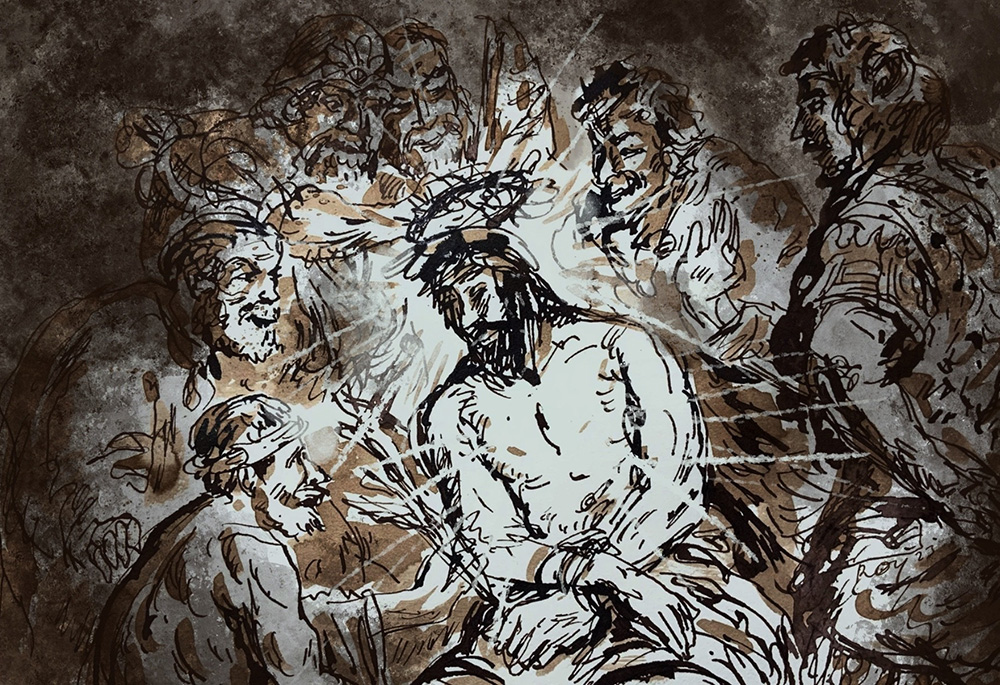
An image of Christ as our "Forever Light," created by Benedictine Oblate Roy DeLeon for St. Placid Priory; the eternal Christ-Light shines in moments of darkness, dispelling the void and bringing forth the presence of God. (Courtesy of Julian Cleary)
Trying all sorts of things, I have come to believe that there is one way to lessen or even eliminate the darkness of suffering — by opening the heart, soul, body and mind to the presence of the light of God. God's light is always present everywhere, even when we do not perceive it.
In the midst of our suffering, we reach out for God's help — with or without words, specific requests, or just with mere desire and longing. We may begin to find the darkness lifting or we may feel no difference. Either way, our hope and trust are that God hears us and will answer us in the way that is perfect. Often it seems that God's answer should be different or quicker, and often it seems that there is no answer from God at all.
Here is where our faith is stretched — believing that God loves us so much that God's response is right, even when it seems not so. Even when it seems there is no answer. We trust that God's response is perfect and love-filled. Having experienced the closeness of God's presence within light, we may find the intimacy of God in dark sufferings as well. The light found in the darkness, even if dim, can be both our comfort and a path to healing.
St. Benedict, in his rule, encourages us to open our eyes to the light that comes from God. This light can be found in opening our eyes in the dark. In this new year of 2024, may we see the light of God in our darkness and suffering or find comfort in the faith that indeed God is present. May the presence of the God of light in darkness dispel all suffering.
Advertisement
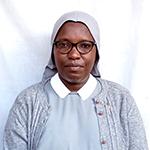
Beatrice Kamau is a Kenyan from the Congregation of the Daughters of St. Anne and is a regional superior for its Kenya delegation. She is a trained catechist, formator and a counselor. She has served as novices' formator and occasionally presents workshops to congregational leaders in Kenya, Uganda and Tanzania for the program Professional Development of Congregational Leaders, or PDCL. She also does part-time counseling.
"A people who walked in the darkness have seen a great light."
When we were young, we were so afraid of darkness. There was no electricity in the countryside, and darkness could be so scary. We could not appreciate gazing at the stars. Away from home, the sight of twilight was not romantic, for we were afraid of nightfall, full of terror and wildness. We always needed someone to accompany us, even going to bed, if possible, to wait until we could fall asleep, just to wake up to another new day.
Darkness can be terrifying, and right from the beginning, God wanted to dispel darkness so that all can be, so that we can be. "God said, let there be light, and there was light. God saw how good the light was. God then separated the light from the darkness" (Genesis 1:3-4). In darkness we lose vision, we are never sure of the next step, and it is risky to trudge in the dark. We are children of light; we have seen this great light in our midst, manifest in the birth of Christ, the true light.
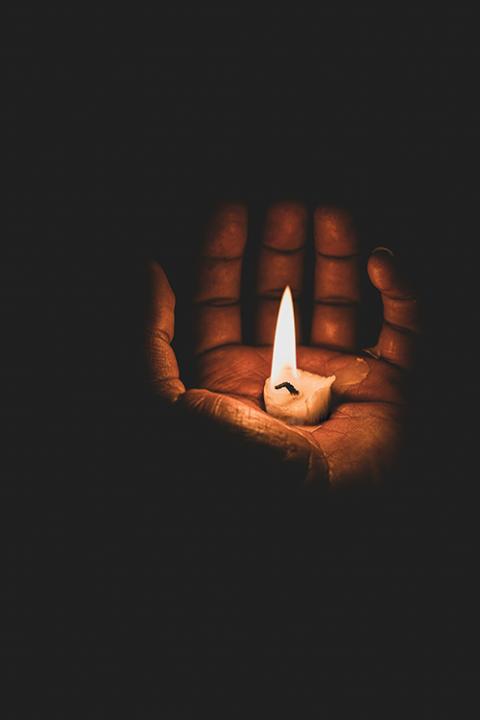
(Unsplash/Eyasu Etsub)
We have just begun the new year, few days after well-lit Christmas festivities. However, something leaves me pondering when I reflect on our social realities as a people. Despite about 85% of the Kenyan population identifying as Christian, an enormous disparity unfolds before us — wanton corruption, inequality, tribalism, child labor and abuse. We are haunted by insecurity, children and women languishing in poverty, victims of violence, the lack of minimum or no social amenities, and medical coverage.
The environment is being destroyed, there is a high cost of living, and unemployment continues to create an abyss between the haves and the have-nots. How do we reconcile these realities as Christians, as children of light? Are we part of those who have seen a great light? What is our role as children of light amid these situations of darkness, despair and fear?
I pray and desire that God may open our hearts to let in Jesus, the true light, so that he can illumine these realities of darkness which continue to persist in our society. May he heal our blindness, indifference, hatred and division so that peace may be restored in the world. As St. Paul calls us, "The night is advanced, the day is at hand. Let us then throw off the works of darkness and put on the armor of light" (Romans 13:12).
Let us embrace the gift of the Emmanuel, God-is-with-us, who has taken up our human nature and born in our human circumstances so that all may be renewed. Let us not lose hope, for he never abandons anyone who desires and seeks him with a sincere heart.
'I pray and desire that God may open our hearts to let in Jesus, the true light, so that he can illumine these realities of darkness which continue to persist in our society.'
—Sr. Beatrice Kamau
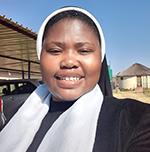
Agnes Motake, of Lesotho, is a member of the congregation of the Sisters of Holy Names of Jesus and Mary in Lesotho province. She joined the community in 2014 and professed her final vows in 2022. She has worked in ministries including teaching preschool and computer at SNJM College and working as a secretary at Holy Names High School. Currently she is a third-year university student, studying for a bachelor's degree in education.
A people walking in darkness have seen a great light. Reflecting on this verse, I realize that, as part of humanity, I often walk in darkness — lacking inner peace, struggling to forgive others as well as myself, and losing hope and trust in God easily as I encounter hardships along the way of my religious life. This darkness makes me doubt God's mercy towards me.
As I begin the new year of 2024, I long for God's light to dispel the darkness of not having inner peace. Without inner peace, living religious life becomes very hard, lacking the joy and happiness the Holy Father emphasizes in his letter to all consecrated people, "Where there are religious, there is joy."
Moved by this apostolic letter of Pope Francis, I long for God's light to fill me with love and happiness — the true sources of inner peace. As Jesus mentioned in John 14:27, "Peace I leave with you, my peace I give unto you: not as the world gives unto you. Let not your heart be troubled, neither let it be afraid." Lord Jesus, let my heart receive and be sustained by your peace in this holy life you have called me to serve.
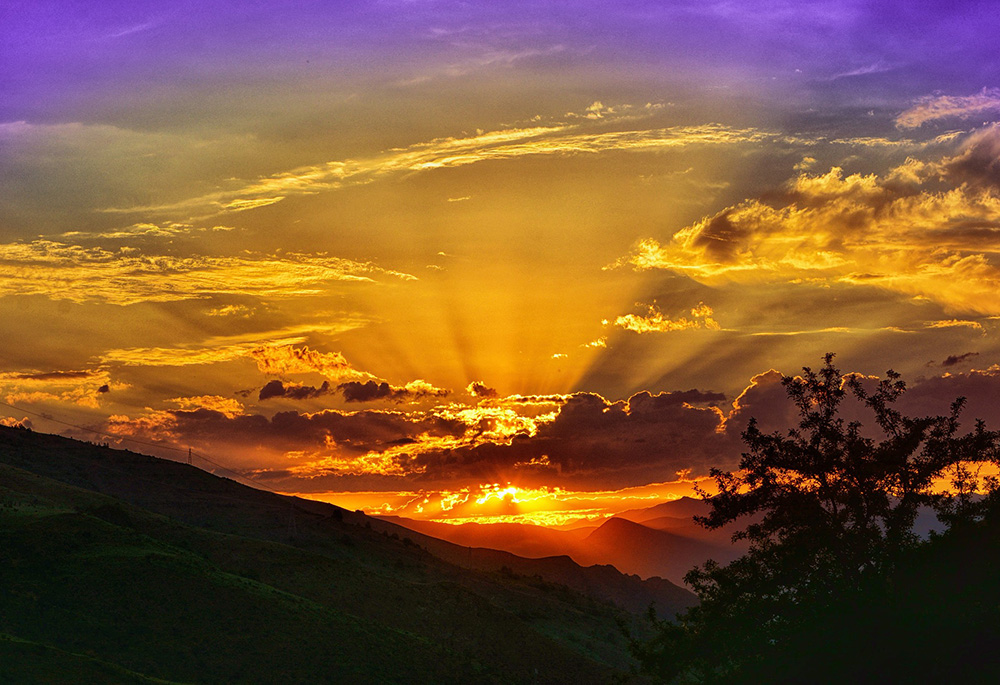
(Pixabay/Rustu Bozkus)
Equally important, I also long for God's light to dispel the shadows of lack of unforgiveness. Forgiveness is the most important virtue a person could have, as it is by forgiving others that we too are forgiven by God. St. Francis of Assisi affirms this saying in his prayer where he said, "It is in pardoning that we are pardoned."
Forgiveness opens us to the light of hope. It moves us from the darkness of anger or sin, or death into life. It is through forgiveness that our lives are not locked in guilt and anger. Thus, having courage to forgive each other and ourselves will always make the radiant light of our God shine upon us.
May the radiant light of God permeate my whole being, allowing the spirit of forgiveness to be my armor throughout 2024. "Be kind to one another, tenderhearted, forgiving one another, as God in Christ forgave you" (Ephesians 4:32). Through this light of God, may all darkness come to an end, let us collectively rejoice in the Lord who made us.

Maureen Ojil is a professed member of the Franciscan Sisters of St. Anne, a dedicated Kenyan working at the Archdiocese of Nairobi Secretariat as an associate administrative assistant in the office for Institutes of Consecrated Life and Societies of Apostolic Life. She earned a bachelor's degree in education and a licentiate degree in canon law. Her passion lies in serving the people of God. She is involved with the Missionary Youth Movement at Our Lady of the Rosary Catholic Church, where she is committed to community service.
Isaiah 9:1 beautifully captures the profound symbolism of darkness and light, providing a rich meditation on the transformative power of Christ's advent. Isaiah's prophecy serves as a poignant reminder that the human condition is one of darkness without divine intervention. While some of us have grown up in well-lit cities and may not fully grasp the concept of darkness, others have experienced the true depth of darkness in the countryside, where it can become so intense that even one's hand is invisible.
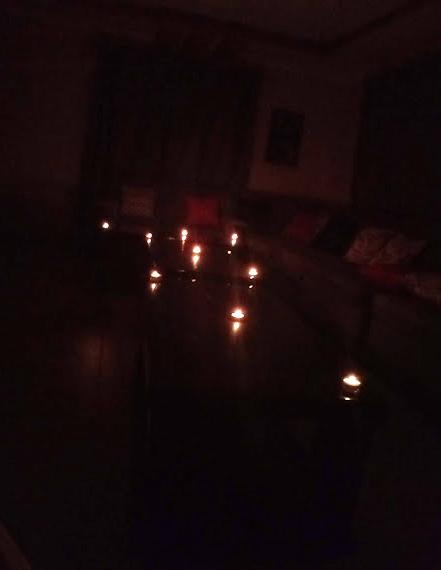
Picture from a visit to Sr. Maureen Ojil's rural home on Sept. 19, 2021, where reliance on candles is necessary due to a lack of electricity (Maureen Ojil)
This is the image in Isaiah 9:1 — that the darkness is so deep and complete, it incapacitates and immobilizes. You can't walk in it with any certainty. You don't know where you're going. You're lost. However, God addresses this problem of darkness through the Christmas story. Those who walked in darkness are described as having "seen a great light." It's not that they turned the light on themselves; rather, the light has shone upon them. The coming of Christ, in this context, becomes the divine solution to this darkness and the subsequent spiritual blindness and death.
A notable darkness is the pervasive sense of isolation and loneliness, a shroud that affects many in our modern world. Despite digital connectivity, profound isolation persists, leaving individuals feeling unseen and spiritually adrift. Complex causes include geographical distances, the frenetic pace of life, societal disconnection, and eroding traditional community structures.
Loneliness isn't just the absence of company but a hunger for validating relationships. It's a darkness that can envelop city streets or crowded social spaces, where individuals walk a solitary path, yearning for genuine connection. Isolation and loneliness are silent epidemics in our interconnected yet emotionally distant society. This darkness obscures the way forward, hindering the recognition of the intrinsic value of human connection.
'The transformative power of Christ's light is not just about alleviating the immediate pain of loneliness; it is about infusing life into the desolate spaces within the human spirit.'
—Sr. Maureen Ojil
How does Isaiah's prophecy help us understand the hope Christ brings to the isolated and lonely? Christ's light, as foretold by Isaiah, brings hope to the lonely soul by offering the promise of genuine companionship. It is a light that not only dispels the darkness of isolation but also creates a profound sense of belonging.
The transformative power of Christ's light is not just about alleviating the immediate pain of loneliness; it is about infusing life into the desolate spaces within the human spirit. It is about restoring a sense of purpose, affirming intrinsic worth, and nurturing a community where every individual is seen, heard and valued. The light of Christ is life-giving, breathing vitality into the weary soul and offering a glimpse of the abundant life promised to those who walk with him. It invites a spiritual connection that transcends physical proximity, assuring that, even in solitude, one is never truly alone.
In Christ, there is a promise of a companionship that understands the depths of the human heart and fills the void with a divine presence. May this be a source of comfort and encouragement for those grappling with isolation and loneliness.





